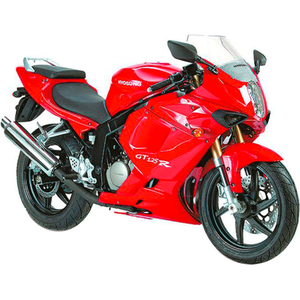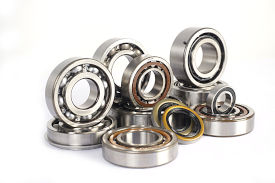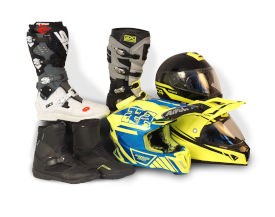Hyosung GT 125R [2006-2017]: A Long-Term Review of the V-Twin Underdog

Introduction
The Hyosung GT 125R is a motorcycle that defies expectations. Produced from 2006 to 2017, this South Korean sport bike carved out a niche in the 125cc category with its unconventional V-twin engine, aggressive styling, and surprising practicality. While often overshadowed by Japanese rivals, the GT 125R offers a unique blend of character and accessibility that makes it a compelling choice for new riders and budget-conscious enthusiasts. Let’s dive into what makes this bike stand out—and where it stumbles—through the lens of a modern-day test ride.
Design & Ergonomics: Sporty Stance, Everyday Comfort

At first glance, the GT 125R looks like it means business. The full fairing, twin headlights, and angular lines give it a purposeful, race-replica aesthetic. Over its production run, color schemes evolved from bold single-tone red (early models) to sharper combinations like white/red and black/red (2013 onward). The 17-liter fuel tank (4.49 US gallons) is notably large for a 125cc bike, contributing to a claimed range of over 500 km (310 miles) thanks to fuel efficiency as high as 77.89 mpg (3.02 L/100km) in later fuel-injected models.
The riding position is a mixed bag. With a seat height ranging from 780 mm (30.7 inches) to 830 mm (32.7 inches) depending on the year, it’s accessible for shorter riders. However, the clip-on handlebars and rearset footpegs create a mildly aggressive posture—more committed than a standard naked bike but less extreme than a full supersport. The seat itself is thinly padded, which becomes apparent after an hour in the saddle.
Engine & Performance: The Charismatic V-Twin
The GT 125R’s party piece is its 124.5cc V-twin engine—a rarity in the 125cc class dominated by single-cylinder engines. Early models (2006-2015) used carburetors (Mikuni BDS26), while 2016-2017 variants switched to fuel injection. Output remains consistent at 14.2 HP @ 10,500 RPM and torque between 9.7–10.2 Nm (7.2–7.5 lb-ft).
What’s it like to ride?
- The V-twin delivers a throaty exhaust note that’s music compared to the buzz of single-cylinder rivals.
- Power builds linearly, with a noticeable surge above 8,000 RPM. You’ll need to work the 5-speed gearbox hard to keep it in the sweet spot.
- Top speed hovers around 110–117 km/h (68–73 mph), though overtaking at highway speeds requires patience.
- The oil-and-air cooling system handles city commuting well, but sustained high RPM runs can make the engine feel strained.
Handling & Chassis: Confidence vs. Weight
Hyosung made significant chassis revisions over the GT 125R’s lifespan. Early models (2006–2012) used a steel double-cradle frame with a 1445 mm (56.9-inch) wheelbase and a hefty 150–166 kg (330–366 lbs) dry weight. By 2017, weight dropped to 120 kg (264 lbs) thanks to a redesigned frame and suspension.
Key handling traits:
- Stable at speed: The longer wheelbase and 17-inch tires (110/70 front, 150/70 rear) inspire confidence on straight roads.
- Heavy steering: The weight shows in tight corners. It’s less flickable than a Honda CBR125R but feels planted mid-corner.
- Suspension evolution: Early dual rear shocks (100–110 mm travel) were replaced by a mono-shock in 2017, improving bump absorption. Front suspension ranged from basic telescopic forks to USD units in later years.
- Braking: Single discs front/rear (300mm front on early models) provide adequate stopping power, though feel is wooden compared to rivals. The 2017 model’s dual front discs were a welcome upgrade.
Competition: How Does It Stack Up?
The 125cc sport segment is fiercely competitive. Here’s how the GT 125R compares:
| Model | Engine | Power | Weight | Unique Selling Point |
|--------------------|--------------|-------|--------|-------------------------------|
| Hyosung GT 125R| V-twin | 14 HP | 120–166 kg | V-twin character, low-cost maintenance |
| Honda CBR125R | Single-cylinder | 13 HP | 137 kg | Honda reliability, sharp handling |
| Yamaha YZF-R125 | Single-cylinder | 15 HP | 142 kg | High-revving engine, premium fit-and-finish |
| KTM 125 Duke | Single-cylinder | 15 HP | 135 kg | Aggressive styling, punchy low-end |
The Hyosung’s edge:
- Audible personality: The V-twin’s growl is a welcome departure from the sewing-machine hum of singles.
- Comfort: The relaxed riding position beats the Yamaha’s race-focused ergonomics for daily use.
- Cost of ownership: Simpler mechanics (carbureted models) and affordable parts make it a budget favorite.
Where it lags:
- Weight: Even the lightest GT 125R is heavier than Japanese rivals, blunting acceleration.
- Resale value: Hyosung’s brand cachet trails Honda/Yamaha, affecting二手 prices.
Maintenance: Keeping the V-Twin Healthy
The GT 125R is a low-stress engine, but its V-twin layout demands attention to a few key areas:
- Oil Changes: Use SAE 10W-40 (1.5L with filter). Hyosung recommends changes every 5,000 km (3,100 miles). Pro tip: Upgrade to synthetic for smoother high-RPM performance.
- Carburetor Tuning: Early models suffer from erratic idling in cold weather. A carb clean or jet kit (available at MOTOPARTS.store) solves most issues.
- Valve Adjustments: With 4 valves per cylinder, check clearances every 10,000 km (6,200 miles). Spec: 0.08–0.13 mm (intake), 0.13–0.18 mm (exhaust).
- Chain Maintenance: The O-ring chain needs lubrication every 500 km (310 miles). Fit a DID 520VX2 chain for longevity.
- Brake Upgrades: Swap stock pads for EBC HH sintered pads for better bite.
Common issues to watch:
- Sticky clutch cables (lubricate monthly).
- Corrosion on exhaust headers (apply high-temp paint).
- Weak starter motors on pre-2010 models (upgrade to a high-torque unit).
Conclusion: The Unconventional Choice
The Hyosung GT 125R isn’t the fastest, lightest, or most prestigious 125cc sport bike. But its quirks—the rumbling V-twin, the bold styling, and the forgiving ergonomics—give it a charm that’s hard to replicate. For new riders seeking a bike that sounds bigger than it is, or seasoned enthusiasts wanting a cheap track-day project, the GT 125R delivers. Just don’t expect it to hold your hand; this is a machine that rewards mechanical sympathy and a willingness to tinker.
At MOTOPARTS.store, we’ve got your back with everything from performance exhausts to ergonomic seat upgrades. Whether you’re restoring a 2006 classic or hot-rodding a 2017 fuel-injected model, our catalog ensures your GT 125R stays as bold as the day you rode it home.
Specifications sheet
| Engine | |
|---|---|
| Stroke: | Four-stroke |
| Max power: | 10 kW | 13.0 hp |
| Max torque: | 10 Nm |
| Fuel system: | Carburettor (Mikuni BDS26) |
| Max power @: | 10500 rpm |
| Displacement: | 125 ccm |
| Max torque @: | 9750 rpm |
| Bore x stroke: | 44.0 x 41.0 mm (1.7 x 1.6 in) |
| Configuration: | V |
| Cooling system: | Oil & air |
| Compression ratio: | 11.3:1 |
| Number of cylinders: | 2 |
| Valves per cylinder: | 4 |
| Dimensions | |
|---|---|
| Wheelbase: | 1445 mm (56.9 in) |
| Dry weight: | 150 |
| Wet weight: | 187 |
| Seat height: | 795 mm (31.3 in) |
| Overall length: | 2090 mm (82.3 in) |
| Ground clearance: | 155 mm (6.1 in) |
| Fuel tank capacity: | 17 L (4.5 US gal) |
| Drivetrain | |
|---|---|
| Clutch: | Wet, Multiplate |
| Final drive: | chain |
| Transmission: | 5-speed |
| Maintainance | |
|---|---|
| Rear tire: | 150/70-17 |
| Engine oil: | 10W40 |
| Front tire: | 110/70-17 |
| Brake fluid: | DOT 4 |
| Spark plugs: | NGK CR8EH-9 or NGK CR8EHIX-9 |
| Spark plug gap: | 0.9 |
| Engine oil capacity: | 1.5 |
| Engine oil change interval: | Every 5000 km or 2 years, whichever comes first |
| Recommended tire pressure (rear): | 2.5 bar (36 psi) solo, 2.8 bar (41 psi) with passenger |
| Recommended tire pressure (front): | 2.25 bar (33 psi) |


















